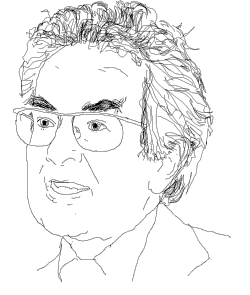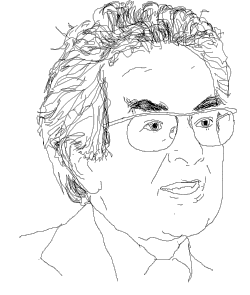 So what about Nagel’s three big issues with materialism?
So what about Nagel’s three big issues with materialism?
On consciousness the basic argument is simply that our inner experience is just inaccessible to science. We still can’t get inside the heads of those bats, and we can’t really get inside anyone’s except the one we have direct experience of – our own. Nagel briefly considers the history of the problem and the theory of psychophysical identity put forward by Place and Smart, but nothing in that line satisfies him, and I think it’s clear that nothing of the kind could, because nothing can take away the option of saying “yes, that’s all very well, but it doesn’t cover this here, this current experience of mine”. Interestingly, Nagel says he actually suspects the connection between mental and physical is not in fact contingent, but the result of a deep connection which unfortunately is obscured by our current conceptual framework; so given a revolution in that framework he seems to allow that psychophysical identity could after all be seen to be true. I’m surprised by that because it seems to me that Nagel is in a place beyond the reach of any conceptual rearrangement (that cuts both ways – Nagel can’t be drawn out by argument, but equally if someone were simply to deny there is “something it is like” to see red, I don’t think Nagel would have anything further to say to them either); but perhaps we should feel very faintly encouraged.
At any rate, Nagel argues (and few will resist) that if consciousness is indeed physically inexplicable in this way the problem cannot be sealed off in the mind; it must creep out and infect our ideas about everything, because we have to give accounts of how consciousness evolved, and how it fits into our notions of physical reality. The answer to that in short is of course that as far as Nagel is concerned it can’t be done, but getting there through his review of the possibilities is quite a ride.
Cognition is the second problem, and somewhat unexpected: that’s supposed to be the Easy Problem, isn’t it? Nagel draws a distinction between the simple kind of reactions which relate directly to survival and the more foresighted and detached general cognition which he sees as more or less limited to human beings. He doubts that the latter is a natural product of simple evolution, which sort of echoes the doubts of Wallace, the co-discoverer of Darwin’s theory; in later life he took the view that evolution could not explain the human mind because cavemen simply didn’t need to be that bright and would not have been under evolutionary pressure to spend energy on such massive intellectual capacity.
Nagel sees a distinction between faculties like sight, and that of reason. Our eyes present us with information about the world; we know it may be wrong now and then, but we’re rationally able to trust our vision because we know how it works and we know that evolution has equipped us with visual systems that pick up things relevant to our survival.
Our reasoning powers are different. We need them in order to justify anything to ourselves; but we can’t use them to validate themselves without circularity. It’s no good saying our reason must be serviceable because otherwise evolution wouldn’t have produced it, because we need to use our reason to get to belief in evolution. In short, our faith in our own cognitive powers must and does rely on something else, something of which a separate, non-evolutionary account must be given.
There’s something odd about this line of argument. Do we really look to evolution to validate our abilities? I have a liver thanks to evolution, but its splendid functional abilities are explained in another realm, that of biochemistry. I don’t think we trust our eyes because of evolution (people found reasons to believe their eyes before Darwin came along). So yes, our cognitive abilities do, on one level, need to be understood in terms of an explanatory realm separate from evolutionary theory – one that has to do with logic, induction, and other less formal processes. It’s also true that we haven’t yet got a full and agreed account of how all that works – although, you know, we have a few ideas.
But surely not even the most radical evolutionary theorists claim that the theory validates our powers of reasoning – it simply explains how we got them. If Nagel merely wants to remind us that the ‘easy’ problem still exists, well and good – but that’s not much of a hit against materialism, still less evolution.
The third big problem is ‘value'” a term which here confusingly covers three distinct things: first, the target for Nagel’s teleological theory – the thing the cosmos hypothetically seeks to maximise; second, the general quality of the desiderata we all seek (food, shelter, sex, etc); third, the general object of ethics, somewhat in the sense that people talk about “our values”. These three things may well be linked, but they are not, prima facie, identical. However Nagel wants to sweep them all up in a general concept of something loosely motivating which is absent from the standard materialist accountHe quotes with approval an argument by Sharon Street about moral realism, with the small proviso that he wants to reverse it.
Street’s argument is complex, but the twice-summarised gist appears to be that ‘value’ as something with a real existence in a realm of its own is incompatible with evolution because evolution happens in the real material world and could not be affected by it. Street draws the conclusion that since evolution is true, moral realism in this sense is false, whereas Nagel concludes that since moral realism is just evidently true, evolution can’t be quite right.
Myself I see no need to bring evolution into it. If moral value exists in a realm separate from material events, it can’t affect our material behaviour, so we have an immediate radical problem already, long before we need to start worrying about such matters as the longer-term history of life on earth.
I said that I think ‘value’ is actually three things, and I think we need three different answers. First, yes, we need an account of our drives and motivations. But I feel pretty confident that that can be delivered in a standard materialist framework; if we lay aside the special problems around conscious motivation I would even venture to say that I don’t see a huge problem; we can already account pretty well for a lot of ‘value’ driven behaviour, from tropisms in plants up through reflexes and instincts, to at least an outline idea of quirte complex behaviours. Second, yes, we also need an account of moral agency; and I think Nagel is right to make a linkage with philosophy of mind and consciousness. This is a large subject in itself; it could be that morality turns out in the end to need a special realm of its own which gives rise to problems for materialism, but Nagel says nothing that persuades me that is so, and things look far more promising and less problematic in the opposite direction. Finally, we have the fuel for Nagel’s teleology; not wanted at all, in my view: an unnecessary ontological commitment which buys us nothing we want in the way of insight or explanation.
To sum up; this has been a pretty negative account. I think Nagel consistently overstates the claims of evolution and so ends up fighting some straw men. He doesn’t have a developed positive case to offer; what he does suggest is unattractive, and I must admit that I think in the end his negative arguments are mainly mistaken. He does articulate some of the remaining problems for materialism, and he does put some fresh points, which is a worthy achievement. I sympathise with his view that evolutionary arguments have at times been misapplied, and I admire his boldness in swimming against the tide. I do think the book is likely to become a landmark, a defining statement of the anti-materialist case. However, that case doesn’t, in my opinion, come out of it looking very good, and by associating it so strongly with misplaced anti-evolutionary sentiment, Nagel may possibly have done it more harm than good.

